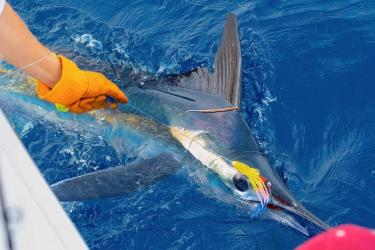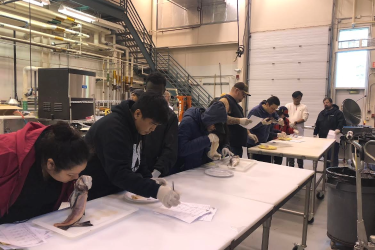All sea turtles found in U.S. waters are listed under the Endangered Species Act as either threatened or endangered. By the late 1970s, incidental bycatch of sea turtles in shrimp trawling gear in the southeastern United States was determined to be a major threat to the survival of sea turtle populations. Our gear research staff, with assistance from the commercial shrimping industry, initiated research to develop solutions to this problem. The result of over a decade of gear development, and subsequent evaluation, was the turtle excluder device.
The modern TED is a simple grid made of metal bars that is fit into a trawl net. Small animals, such as shrimp, pass through the grid into the mesh bag at the end of the trawl and are caught. When larger animals like sea turtles enter the trawl net, they are redirected by the TED and are able to exit through an opening either at the top or bottom of the net. Current TED designs have been determined to be 97 percent effective in excluding turtles from shrimp trawls. NOAA Fisheries gear experts continue to work with the shrimp fishing industry to develop new and effective ways to reduce bycatch.
Today, many shrimp trawlers operating in the U.S. waters of the Gulf of America* (formerly Gulf of Mexico) and South Atlantic are required by federal law to equip their trawls with a TED.
Shrimp Fisheries Biological Opinion
In April 2021, NOAA Fisheries completed its most recent evaluation of the impacts to sea turtles and other protected species from southeast shrimp fisheries under Section 7 of the Endangered Species Act. Read the opinion document (PDF, 297 pages).
*Executive Order 14172, “Restoring Names That Honor American Greatness” (Jan. 20, 2025), directs that the Gulf of Mexico be renamed the Gulf of America. Gulf of America references in this website refer to the same area as the Gulf of Mexico in the applicable regulations under 50 CFR parts 216–219, 222–226, and 600–699. The name change did not result in any changes to, and had no effect on the applicability or enforceability of, any existing regulations. This website continues to use “Gulf of Mexico” when quoting statutes, existing regulations, or previously published materials.



